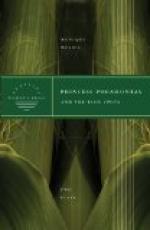Finding they could not weaken his decision, they sought to steal the swords. They were discovered and Smith, realizing that the time had come when a decided stand must be taken, had them whipped and imprisoned. Some of the Council protested, declaring that this was the wrong way to treat the Indians and urged that Powhatan was sure to resent their action. How did Smith know, they asked, that these savages were acting at the command of their chief? Was it not merely a sudden impulse of anger that had led them to take what ought to have been given them?
But the prisoners, who believed in Smith’s power to read the past as well as the future, thinking it useless to try to hide the truth from him, confessed that Powhatan had commanded them to secure the swords by any method. Powhatan was now aware that his plan had failed and that it was necessary for him to disavow the deed of his messengers. To convince the palefaces of his good faith he must send some one to talk with them whom they would trust. And so it was that Pocahontas went to Jamestown as ambassadress.
Accompanied by slaves bearing presents of food, seed corn for the spring planting and pelts of deer and bear and wildcat, Pocahontas was received at Jamestown with much ceremonial.
“I bear these gifts from The Powhatan,” she said to Smith, who always acted as interpreter. “He begs thee to excuse him of the injuries done by some rash ontoward captains his subjects, desiring their liberties for this time with the assurance of his love forever.”
The manner in which she delivered this little speech was so frank that Smith knew she was ignorant of her father’s real part in the theft. The men had had their lesson, and Powhatan his warning, therefore clemency might be effectively dispensed.
“Dost thou desire, Matoaka, that these men should be freed?”
“Oh, yes, my Brother,” she replied eagerly. “Thou knowest thyself how the trapped man or beast pines to escape. My heart is sad at the thought of any creature kept in durance.”
“And yet, little Sister,” answered Smith gravely, while he watched her quick change of expression, “I needs must deliver up these prisoners of mine to another gaoler, to one who will treat them as sternly as thou didst treat me at Werowocomoco.”
Pocahontas’s drawn brows indicated her endeavor to understand his meaning.
“Wilt thou be their gaoler, Matoaka?” he asked; and she, suddenly comprehending his joke, laughed aloud.
The men were given into her custody and on her return home Powhatan was much pleased with his daughter’s embassy.
In September of that year Smith at last was made in name, what he had long been in fact, the head of the colony. As President he could now carry out his plans with less opposition. The building of new houses and the church went on briskly; the training of men in military exercises, the exploration of the shores of Chesapeake Bay—all these received his attention. Master Hunt, the clergyman, whose library had been burned in the fire, spent his time in encouraging the colonists, and twice each day he held his services in the church for whose altar he melted candles and gathered wild flowers.




